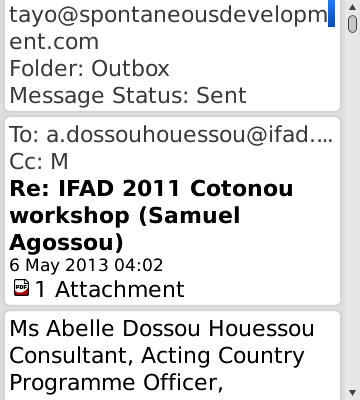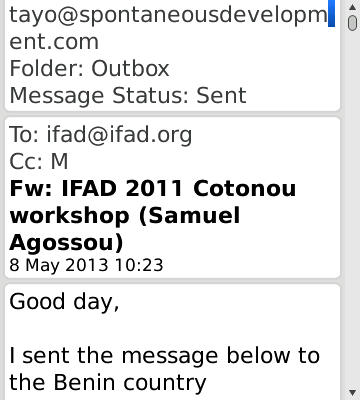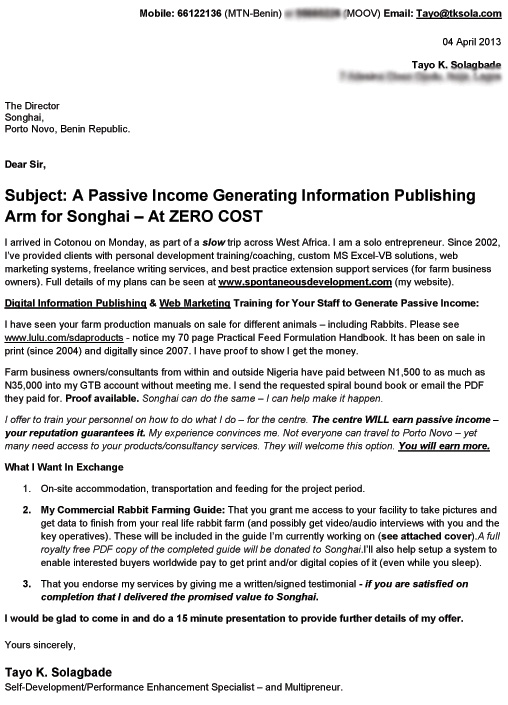It’s been an interesting experience trying to implement my plan for finishing off this guide. So far I’ve only established working relationships with micro operators who have backyard rabbitries they run. (I’ll confess though, that other activities have eaten into time I could have put into following up more effectively).
I already have videos and photos following the ready access they’ve granted me to their facilities. I’m currently helping one look for restaurant and hotel operators interested in placing bulk orders from him.
For my purposes however, I need access to much larger operations, to make this guide more useful for those who will use it.
That’s why I’m keen to connect with Agossou and Songhai.
1. Samuel Agossou
One aspect of my plans that’s not progressing well is my search for Samuel Agossou, a Beninese farmer who reportedly bred 700,000 rabbits in 7 years, bought a house for his family from profits, and pays each of his 12 employees $25 US Dollars monthly.
Watch this video about him:
I found out about him 4 months ago through some foreign NGO’s website.
I’ve read about the 2011 IFAD workshop held at Cotonou’s Palais Du Congress (Google it), where he was discovered.
And I’ve also read this PDF TerraViva report published by IFAD which proves (?) he’s based right here in Benin Republic.
In my article, I mentioned meeting with members of an NGO based in Cotonou (CINC), who were also featured in the above mentioned TerraViva report.
However, they also did not know Agossou.
Why I Want to Meet Agossou
My purpose is to request an interview with him to be published as a special feature in my Commercial Rabbit Farming Guide (see http://www.tayosolagbade.com). He gets a FREE complimentary PDF copy of the finished guide.
I also wish to offer him ideas (e.g. income generating uses of rabbit pelts and other by products), and support, to prepare learning resources to train interested others.
It is my considered opinion, that this amazing gentleman’s expertise can be used to boost agro entrepreneurship and related income, not just in Benin, but across the entire continent of Africa.
I’ve Written Emails to IFAD & Gotten No Responses
And after my last post in which I mentioned reading an IFAD TerraViva report about him, I’ve written emails to IFAD.
I requested their help in retrieving contact details he must have submitted as a participant in the 2011 workshop.
A. Ms Abelle Dossou Houessou – Consultant, Acting Country Programme Officer,
IFAD
Below: Screenshot of e-mail I sent to her
I basically requested possible data to contact him. No response came back to me.
b. I then decided to write directly to IFAD, using the details on their website.
Below: Screenshot of e-mail I sent to IFAD
Again, I got no response to my email.
It’s All So Strange – This Silence In Spite of Volumes in Web Pages and PDF
This makes me wonder what exactly to think. Could it be that the people who told me Agossou does not exist are right?
If yes, does that not by implication make IFAD look bad, considering all the elaborate coverage they have given this guy on their website, and publications?
2. Songhai Integrated Farming Centre in Porto Novo
During my very first week here, on the 4th of April to be specific, I travelled from Cotonou to Porto Novo, to drop off my proposal to the director of the popular Songhai Integrated Farming Centre.
I’ve known Father Godfrey Nzamujo since 1987 or so, when I read about the Hunger Project Award given to him, in the monthly African Farmer magazine I subscribed to at the time.
Back then I was a student of Agriculture in the University of Ibadan.
People who know me well will easily attest to the fact that once I develop solid interest in anything, nothing – absolutely nothing – can make me drop it.
Right through my five year stay in the university, as well as during my 7 year sojourn in paid employment in Guinness Nigeria, I tracked progress made by Nzamujo. Word spread about his work. Newspapers did feature reports on him/the centre. At a point, transcripts of speeches he gave began turning up on some websites.
Songhai eventually put up a website.
However I remain quite dissatisfied with what they currently do with that website. This is not about web design or technology. It’s the USE to which they put it that I refer.
They can get more tangible value from it. In my letter, I offered NO FEE learning events to help them make their website generate reliable passive income streams for them.
There is so much they do they can monetize digitally – including their “information and expert know-how or expertise”!
Not everything has to be done physically and in person.
A well conceived Web Marketing Plan can help this wonderful organization serve many more people.
Some people cannot afford to travel to Benin, but they need access to the amazing wealth of information and education the Songhai centre offers.
Such people can be effectively served what they need via the website. And the centre can reap financially rewarding benefits in the process.
People do it every day on the web. Songhai has everything it takes to do the same. And their graduates can learn how to use the web in the same way to reap MORE rewards as experts in their fields.
I’ve been doing it since 2007 with my Cost-Saving Farm Business Support Website, where I offer my feed formulation handbook and sofware for sale. And I do not even have a farm business on ground yet!
I met with key officers at the centre, who advised me on how to drop off my proposal to the Director (who had travelled). They made it clear that he alone can review my offer.
Below: A screenshot of the letter I dropped off with the secretary in his office:
Since then, I’ve tried calling by phone, but each time I’ve been informed he travelled.
Under such circumstances, very little looks possible for the moment. So I’m thinking of a stunt I can pull to get the director’s serious attention 😉
Got any ideas I can use?











